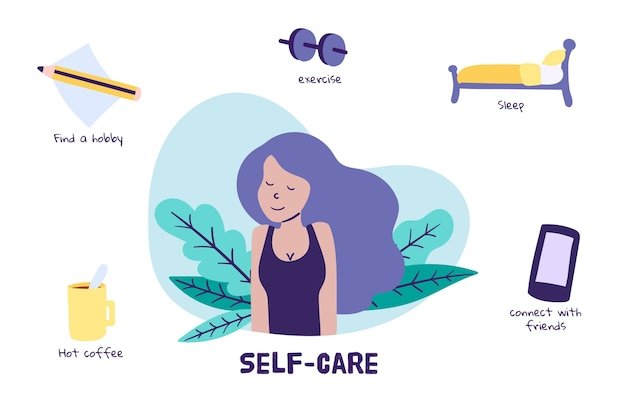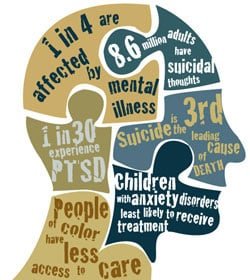Essential Self-Care Tips for College Students
Deep Thinking | 909 Visits

A student's life has many dimensions, from struggling to get good grades to managing to get the cutthroat competition cracked, also poor diet quality for those living in hostels, sometimes they need to manage finances, and at the end obviously, we can not ignore the pain of isolation from family and loved ones
Although everyone is susceptible to mental illness, college students are the most vulnerable sections. College students conventionally in their adolescence are usually associated with lots of transitional changes in physical, psychological, and social environment. This is the reason why most students agreed that their mental health has worsened in college. Most of the serious mental health disorders are reported to have their onset during adolescence.
Surprisingly suicide is a major issue among college students making it the third most common cause of death among adults. Indian Council of Medical Research (ICMR) survey revealed that 12-13 percent of students in India suffer from psychological, emotional, and behavioral conditions. These problems need a solution, which has to be multidimensional involving all stakeholders.
How students can help themselves?
There are various self-help tips that students can adopt to manage their mental health. We all know that students are always in a high crisis of time for self-care this is the reason we have tried to include the least time-consuming and most effective self-care tips in this article.
1. Meditation and self-awareness
Take out time from your daily routine for just 15 minutes of meditation. You can practice deep breathing or mindful breathing. Be self-aware, focus on your problems don't try to ignore them, try to find out from where they are coming and seek their solution. Ignoring the problems makes them worse.
If you feel your feelings are uncontrollable consult an expert. You can get a reliable one from here https//:glexpace.in.
2. Time Management is the key.
Try to balance academics, extracurricular activities, and personal life. Putting too much time only on one aspect and ignoring the other can be daunting. Create a schedule, and try to pre-plan everything. The most important thing here is leaving nothing for the last moment.
3. Deep and sound sleep is a must.
Good quality sleep is crucial for better management of several essential functions of the brain, such as processing and consolidating memories, facilitating learning, and regulating emotions. You can follow the following tips for a healthy sleep cycle.
-Establish a consistent sleep schedule, going to bed, and waking up at a fixed time.
-Create a calming bedtime routine, such as reading, taking a warm bath, or practicing relaxation exercises.
-Keep your sleep environment cool, dark, and quiet to promote healthy and undisturbed naps.
-Practice sleep hygiene, and keep your sleeping clothes, bed, and place clean.
-Stay away from any kind of screen at least 2 hours before going to sleep. Keep your sleeping area a technology-free zone.
-Avoid caffeine, heavy meals, and stimulating activities before sleep
4. Engage yourself in physical exercises.
Make time for activities that involve adequate physical activity, it can be dancing, walking, or simply playing your favorite sport. Practice daily exercise and yoga. Physical activities boost endorphins thus help in reducing stress and anxiety.
5. Balanced diet and mindful eating
Food is fuel for not only your body but also for your brain. Have a wholesome balanced diet. Don't skip any meal of the day. Practice mindful eating habits. Incorporate nutrient dense food in your diet.
6. Disconnect and recharge
Limit screen time to avoid information overload. Engage in hobbies or activities that disconnect you from technology. Spend time in nature to refresh your mind and boost your mood.
7. Social Interaction
Engage with your support network of friends, family, and peers. Meaningful relationships provide emotional support and a sense of belonging, which are essential for your well-being.
8. Engage in creative hobbies
Art is the best way to drain stress from your mind. Practice creative hobbies like painting, dancing, singing, playing any musical instrument, cooking, or sewing. These activities provide an outlet for self-expression and stress relief.
9. Seek Professional Help:
If you find yourself struggling with mental health concerns, don't hesitate to seek help from a counselor or therapist. Your college likely offers counseling services to support students' well-being. You can also visit us at https//:glexpace.in.
Self-care is essential for an individual's survival. Prioritizing yourself is crucial for your mental health. Remember mental health issues of any kind should not be taken lightly. Not all mental health issues vanish with time, not all can be dealt with by your selves. Seeking professional help is taking care of yourself. Mental health issues like anxiety, stress, and depression on long-term ignorance can lead to serious health issues. In such a scenario seeking professional advice is a wise decision.
Thanks for reading!
If you enjoyed please leave a like, join discussion in the comments and share it
with your friends!
Pratyusha941760's Recent Articles







